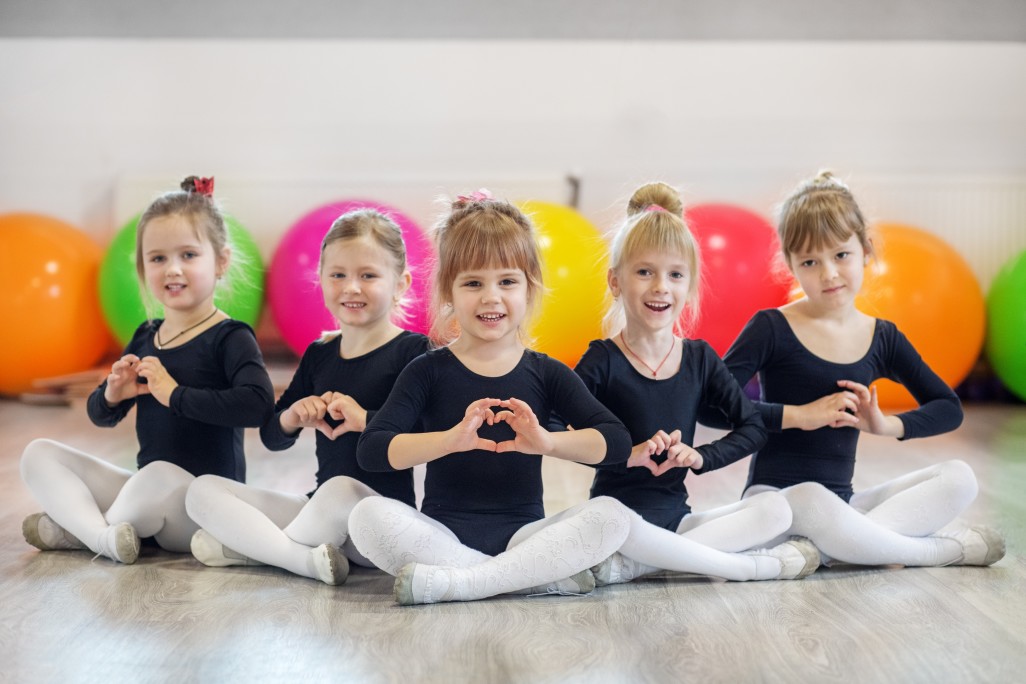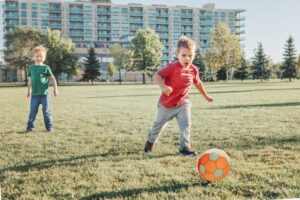Healthy social and emotional development depends on the experiences that your child has during their first five years. Sports are a great way to help your preschoolers build the skills they’ll need later in life. However, it’s essential to make sure that the sports you’re enrolling your little ones are age-appropriate. Here are our recommendations for using sports to build the skills that your child will need to thrive!
Preschooler Sports:
- Basic skills
- Gymnastics
- Soccer
- Baseball
- Basketball
Basic Skills for Sports
The first step in preparing preschoolers for sports is to practice the necessary skills they need, including running, catching, throwing, and kicking. There are dozens of family games you can play starting at a young age that will help children build the skills they need to be more athletic.
- Running: To practice running with your child, add family games such as tag, stop and go, and follow the leader to your routine. Running helps with skills such as endurance and balance and is excellent for overall heart health as well.
- Catching and throwing: These necessary skills help with hand-eye coordination, muscle control, and other fine and complex motor skills. Catching and throwing is something you can practice with children as soon as they can sit up. Sit on the floor and roll a ball to your child, and then encourage them to push it back to you. As they grow older, add family games that practice catching and throwing with soft objects of different sizes, such as balled-up socks, beach balls, and soft athletic balls such as soccer balls and volleyballs.
- Kicking: Practicing kicking is essential if your child has an interest in playing soccer. One of the skills you can develop with preschoolers to help them improve their kicking ability is balance. Use family games to help your child practice standing on one leg and then the other. When you begin to practice kicking, make sure you’re on a soft surface in case they fall!
- Social and emotional skills: Although the physical skills your child needs to play sports are important, it’s essential to remember the social and emotional aspect as well. Include family games that practice sharing, taking turns, patience, and good sportsmanship in addition to activities that focus on physical skills.
Although it can be tempting to encourage your child to participate in more formal classes at a young age to develop their talents, research doesn’t support a link between preschool sports participation and success at the sport later in life. When searching for classes for your child, remember to choose activities that are fun, age-appropriate, and safe. Also, always practice good sportsmanship and encourage preschoolers to do the same.
Gymnastics for Preschoolers
Dance and gymnastics are two of the best sports for young children because they encourage muscle strength, flexibility, balance, and discipline. These sports are an excellent choice for preschoolers because they focus on play. Basic gymnastics classes feature activities that enhance fine- and gross motor skills, coordination, strength, and social skills in a fun and exciting way. Your child will also practice running, jumping, rolling, climbing, and balancing, which are all wonderful, necessary agility skills for their physical development.
Soccer Skills
Once preschoolers have gained skills in running and kicking during family games at home, soccer can be a fun activity for them to pick up. Many cities have recreation leagues that offer a variety of sporting options for children at an affordable price. Soccer is a fun activity for preschoolers because it requires less coordination than other sports while being fun and interactive.
Many soccer programs offer classes for children as young as two years old that focus on the different motor skills involved, such as balance, following directions, kicking, and running control. As preschoolers advance through varying levels of soccer, they will learn more advanced skills and can begin to see if the sport is something they will enjoy later in life.
Baseball for Preschoolers
Baseball is a sport that requires a higher level of concentration and high-eye coordination than many preschoolers are capable of. Most recreation leagues for baseball begin at age five, although some start at age four. Enrolling children in baseball before age five is a good idea if your main goal is to help them make friends, run around, and work on soft skills such as throwing and catching. However, many of the skills that preschoolers will practice in a recreation league when they’re young they can also practice at home with different family games. This idea goes back to the basic skills mentioned above, such as catching, throwing, and running.
Best Age for Playing Basketball
Learning to play basketball has similar challenges to baseball for preschoolers. Although children may be able to throw and catch a ball during family games, they cannot generally understand drills that many leagues use for practice. However, that doesn’t mean that preschoolers aren’t able to practice the skills they will need to play when they get older.
Once your child can catch a ball, you can begin to teach them how to bounce a ball and catch it. It’s crucial to use a soft ball for this activity, because your child will undoubtedly throw the ball at the ground harder than they realize, and it will bounce back and hit them in the face. In addition to bouncing a ball, you can also use family games to help them practice tossing a ball into a goal. Use beanbags or socks to practice when they are young, and then graduate to a miniature size basketball hoop when they become older.
It’s important to remember that the social and emotional skills your child will need to play structured sports are just as essential as the physical ones. Use family games at home to practice sharing, patience, taking turns, and following directions to ensure your child is fully prepared to take over the court or field when their time comes!
At The Breakie Bunch, our staff focuses on all aspects of your child’s development to ensure they thrive. We provide high-quality child care for children beginning at six weeks of age up to age 12.


